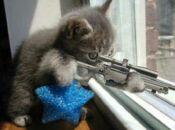July 07, 2004
(Writings on The Chiefs will become more frequent as the season approaches)
If you've followed the Chiefs' offseason much at all, you've heard The Question, to wit: (how) can the Chiefs be any better on defense when their only significant addition was Gunther Cunningham?
A few thoughts on that. First, who says Gunther was the only significant addition? I do remember an amateur draft occurring sometime in April, and someone named Junior being drafted in the second round. That could make a huge difference.
From what I understand, professional football defenses perform at a very high level, and the difference between #1 and #32 isn't all that big...particularly since the Chiefs don't need to have the #1 defense. Sometimes all it takes is the addition of one extra person to shore up a weak link. And the two weak areas of KC's defense were the heart of the defensive line and Middle Linebacker after Maz got hurt. One could easily argue the second was the most important, because the Chiefs defense performed far better in the first half of the season than the second. But Kavika Mitchell gained valuable experience playing for Maslowski. He didn't perform well enough last year, but he's taking multi-game starting experience into training camp this summer, and that should make a tremendous difference. Moreover, a potentially-excellent linebacker in Key Fox was added to the mix through the draft. Let's not forget that the Chiefs have an excellent history of finding good talent that others miss: consider Eric Hicks, an undrafted free agent, and Scott Fujita, a 5th-round pick who played at near-Pro Bowl levels last year. Who knows if someone not expected to excel might end up being a star on defense?
But that's merely musing on variables and potentialities. There are four reasons I think KC's defense will be significantly improved next year.
One: while nearly every other team faced the task of replacing a departed key member of their defense, Kansas City retained every single player. "So what?" you say, "KC's defense wasn't that good last year, so retaining mediocre players won't help." Au Contraire, as they say in some countries without any football programs whatsoever. One of the reasons why so many free agents are considered busts are because they performed at a high level in a system they "grew up" in. Perhaps the system they played in wasn't designed for them or their strengths, specifically, but their strengths matched well enough to excel. They play in that system for 2, 3, or more years, understanding it well enough to internalize its precepts, to play instinctively rather than thinking about what needs to be done. Even if the system changes, they are still playing alongside people they know, whose abilities they are familiar with, so they know what their teammates will do and what gap they need to fill...
Take that player out and put him in a new system...and an adjustment needs to be made. The very best can make that adjustment, but not everyone is the very best. Free agent acquisitions often take more than a year to play at a top level, and shouldn't be evaluated as success or failure until after their second year, unless they are brought in specifically to be a role player. Sure, Rodney Harrison was more than that for the Patriots...but how many unheralded free agents did they sign on the cheap before they got Rodney? And Rodney was far from a sure thing, mind you; the Pats got far more out of him than anyone expected.
All of which means that even without the addition of Siavii, Fox, and Gunther Cunningham, the Chiefs would probably have a better defense just from key players like Fujita, Barber, McCleon, Sims, and Mitchell having another year of experience together.
Two: Let's not forget that players like Woods, Hicks, Wesley and Warfield earned their starting positions by playing in Gunther's system, and only Woods, perhaps, played as well under Greg Robinson.
Three (and more importantly): We must look at how the Chiefs' defense performed badly last year. Generally, the defense played worse in the second half than the first, and worse later in the year than earlier, and worse on the road than at home. Although the reasons for this aren't obvious at a glance, everything I've read says that Robinson's defense was based on predictions and out-maneuvering opponents. It is probably unfair to say that it was a passive/reactive system because he could bring blitzes at unexpected times and from unexpected directions. At its best, it did dictate to the opposing offense, and that's what you want from a top-notch defense. Unfortunately, at its worst it could be a step short all day. If the opposing offense coordinator was unpredictable and got in a rhythm, he could apparently play Robinson like a fiddle, as evidenced in Cincinnati and Minnesota.
If Robinson was correct, the play would be stopped dead by the defense, but if he guessed wrong, players were completely out of position to back each other up. If Robinson was wrong, only one defensive player with perfect execution was in position to prevent catastrophe, i.e., a huge gain. The problem with that weakness is it doesn't take account of the other team's offensive playmakers. And so, it seems Robinson's system depended on Robinson's mind for success...which kinda makes sense regarding the overall failure, since the longer you play a game, the farther you are into the seaon, and the more years you are in the NFL, the more your trends and tendencies are chartable and predictable. Which brings us right back to the general truths about the Chiefs' defense: better earlier and worse later.
Every system has flaws, both offense and defense. But Gunther's system relies less on chess-like moves and more on disruption. It allows players to play, rather than fill roles and positions. In Gunther's system, the star will not be the coordinator, but the player who performs well...and that could be anyone. It doesn't matter who steps it up, because Gunther's system doesn't necessarily depend on a shut-down corner, a rangy linebacker, a ball-hawking safety, or a disrupting lineman. Rather, it allows any player with decent instincts to be in a position to become that player.
Fourth: Moreover, Greg Robinson's defense, like any defense, played far better with a lead than when trying to catch up. When the Chiefs had leads, Wesley, Warfield, Barber, Fujita, Woods, Sims, et al, looked like Super Bowl players. Playing from behind and looking for a stop, they looked as frustrated and incapable as could be. Clearly, one way to improve the defense would also be to improve the offense. While it may seem like an impossible task, the Chiefs may have actually done that.
Even without the addition of Gunther, the early indications from mini-camp practices are that the Chiefs struck gold (or at least silver...) with picks Kris Wilson (TE/WR) and Sammie Parker (WR). WR was one of the less-bright spots for the Chiefs, and one reason for the loss to the Colts was the mediocre performance by the WR corps, allowing the Colts to key on Tony Gonzales. If Parker displaces Boerigter or pushes him to overcome a significant sophomore slump, things should open up for the passing offense. Even if the WR corps doesn't show significant improvement, Kris Wilson is catching everything thrown to him, and his blocking ability makes him a nice twin threat when paired with Tony G. Al Saunders is too good to not exploit all the match-up problems created with the addition of Wilson.
And the most significant departure, heck, the only significant departure was OT John Tait. To tell the truth, the guy has never really impressed me. I hoped for big things from him, but he's shown immaturity and whininess since day one. His departure would be addition through subtraction just from the removal of a simmering source of resentment stemming from the initial contract obligations and exacerbated by his unceremonious switch to RT when Willie Roaf arrived. But the Chiefs did even better by signing two solid OL free agents (Bober and Welbourn, both starters for other teams), the continued development of strong OL picks from 2003, and the surprising ability of 2004 pick Kevin Sampson. This all results in an astounding level of depth at a position that was dangerously thin just last year. The only thing they can't replace is the chemistry of seasons of playing together...but I gotta think that RT is easily the least important as far as chemistry goes.
And from all accounts, Trent Green has stepped it up another level. If true, he will be playing at an All-Pro/Hall of Fame level, and that should strike fear in the hearts of opposing head coaches and coordinators.
As it stands, Kansas City doesn't need to go after anyone in free agency this year. If the perfect situation arises, they can sign someone, but they don't need to. They have the depth to overcome injuries (which they didn't last year), a top-notch offense, a defensive coordinator generally regarded as one of the best in the game, and a team poised and hungry for a Super Bowl title.
Bottom line: the only weakness last year was the defense when behind in close games. The best way to fix this is to make sure you are always ahead, and the Chiefs did take steps to upgrade the offense. The second best way to fix this is have a system that allows players to succeed, and the Chiefs did this with the addition of Gunther. The third best way to fix this is to grow a solid defense by retaining your own players and allowing experience and competition to result in the best team executing the best teamwork on the field. The Chiefs did this, too. I'm expecting big things this year...
Chieftalk makes me miss home....
Posted by: Rae at July 7, 2004 10:16 AMGO CHIEFS!!
*grins*
 |

|
Prev | List | Random | Next Powered by RingSurf! |

Aphorisms (43)
Aung San Suu Kyi (4)
Blogging (213)
Car Issues (47)
Cat Blogging (6)
Catch-All (1)
China/Taiwan (65)
For Jeremy Gilby (10)
Fun With News Headlines (13)
Gun Issues (23)
GWOM (46)
GWOT (131)
Humor (76)
Jagged Alliance (11)
Kansas City Chiefs (106)
Kidblogging (20)
Liberal Democrats Are on the Losing Side of History (10)
Link O' Admiration (168)
Media Distortions (88)
Meme Stolen from Jeff G. (20)
Militaria (24)
Montana, My Home (1)
Music/Guitar (53)
New Thinking (18)
News of the Lowest Common Denominator (1)
Parenting/Leadership 101 (8)
Politics As Usual (324)
Puns (23)
Quotes You Can Steal (42)
Rhetorical Questions (27)
Snark (14)
Snarky Self-Deprecation (14)
Social Issues (268)
Spiritual/Theology (5)
Stuff Important to Me (171)
The Association of Military Linguists (1)
The Brain Fertilizer Way (52)
UK Stupidity (4)
Writing (23)
August 2008 (15)
July 2008 (13)
June 2008 (4)
May 2008 (17)
April 2008 (23)
March 2008 (57)
February 2008 (45)
January 2008 (39)
December 2007 (8)
November 2007 (13)
October 2007 (5)
September 2007 (33)
August 2007 (82)
July 2007 (44)
June 2007 (31)
May 2007 (3)
April 2007 (16)
March 2007 (7)
December 2006 (9)
November 2006 (14)
August 2005 (13)
July 2005 (58)
June 2005 (97)
May 2005 (41)
April 2005 (100)
March 2005 (135)
February 2005 (114)
January 2005 (77)
December 2004 (143)
November 2004 (151)
October 2004 (92)
September 2004 (113)
August 2004 (91)
July 2004 (145)
June 2004 (121)
May 2004 (123)
April 2004 (83)
In No Particular Order
The informed Reader
Kevin Miles
Hot Air
Future Pundit
mtpolitics.net
Michelle Malkin
Resurrection Song
The Real Dave Whiskey in My Sippy Cup
The Politburo Diktat
Ipse Dixit
Kevin I (blogoSFERICS)
Protein Wisdom
The White Peril
The Conspiracy
Slate (mainly for Kausfiles)
Kevin II (Wizbang)
Mudville Gazette
Blame Bush
Wuzzadem
The Horse's Mouth
Sharp as a Marble
Q and O
Ace O' Spades
Wadcutter
Dawn's Early Light
Seven Castles
Shenzhenren
EastSouthWestNorth Blog
The Roost
IMAO
Jeremy Gilby
Honda Fan Site
Amazon's Auto Blog
The Truth About Cars
Cox and Forkum
Chris's Invincible Super Blog!
Caption This!
Right Wing Sparkle
Blogblivion
Captain's Quarters
Iowa Hawk
Llama Butchers
Topic Drift
Witting Shire
Cool Tools 4 Men
Michael Williams
Industrial Blog
INDC Journal
Rosemarie, the Queen of All Evil
Sand in the Gears
La Shawn Barber
Dean's World
Sine Qua Non
Balloon Juice
Absinthe & Cookies
Scrappleface
Cut on the Bias
Spare Change
De Doc
Healing Iraq
The Mesopotamian
DC Thornton
Jane Galt
Iraq Now
Viking Pundit
Aimless Forest
Wince and Nod
Freedom Blog
Left and Right
Weekend Pundit
Baby Troll
Jana
I Am Always Right
Snug Harbor
King of Fools
Suburban Sundries Shack
Boy From Troy
Blogs of War
Speed of Thought
Hubs and Spokes
Mass Backwards
David
Evolution 3.0
Unravelled
Perry on Politics
Yorkie Blog
Aardvark!
Presto Pundit
North Shore Journal
Diogenes Corner
The New American Revolution
Acorns From An Okie
After Abortion
TMMKKT22
RAW 360
Anywhere But Here
I Was Thinking
| Pagerank |
| Sun | Mon | Tue | Wed | Thu | Fri | Sat |
|---|---|---|---|---|---|---|
| 1 | 2 | 3 | ||||
| 4 | 5 | 6 | 7 | 8 | 9 | 10 |
| 11 | 12 | 13 | 14 | 15 | 16 | 17 |
| 18 | 19 | 20 | 21 | 22 | 23 | 24 |
| 25 | 26 | 27 | 28 | 29 | 30 | 31 |
(Use 'em to prove me wrong...I dare ya)
News Feed Online
Liberal Celebrity Quotes
Drudge
NRO
Strategic Forecast
The Most Trusted Name In News
Gun Broker
Homestar Runner
World Builder Projects
Iraq Casualty Count
The Guys Get Shirts
Bureau of Labor Statistics
Badger?
Lapland
A Secular Franciscan Life
An Offering of Myself to the World
Better Living Through Blogging
Big Skies
Big Sky Dave
billingsblog
Brain Fertilizer
Brain Rain
Brian Schweitzer Campaign Blog
City Lights
Front Burner Blog
Gates of the Mountains
Glenn Ferren
Ground Plums and Gun Smoke
Jared Knowles
John Clayton
Mental Wanderings
Mike Erickson
Miss Bonkrood
mtpolitics.net
No Girl Friday
Not Geniuses (Matt Singer)
Para-Bellum.net
Revolving Duck
Sarpy Sam
Scrambled legs and achin'
T.L. Hines
The Monkey Cage
Watermark
Wulfgar!

People's Republic of Seabrook
SKBubba
Opinions You Should Have
Frank at Bloggram
Democrat Underground
Intel Dump

Site Hosted by
MuNuviana

MuNu Site Tweaked
by HammerHead
Syndicate this site (XML)
Powered by
Movable Type 2.64

